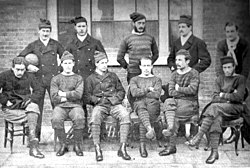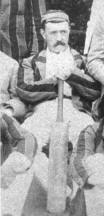 An illustration of the FA Cup trophy awarded in 1872 | |||||||
| Event | 1871–72 FA Cup | ||||||
|---|---|---|---|---|---|---|---|
| |||||||
| Date | 16 March 1872 | ||||||
| Venue | Kennington Oval, London | ||||||
| Referee | Alfred Stair (Upton Park) | ||||||
| Attendance | 2,000 | ||||||
The 1872 FA Cup final was a football match between Wanderers and Royal Engineers on 16 March 1872 at Kennington Oval in London. It was the final of the first staging of the Football Association Challenge Cup (known in the modern era as the FA Cup), which became the primary cup competition in English football and the oldest football competition in the world. Fifteen teams entered the competition in its first season and, due to the rules in place at the time, Wanderers reached the final having won only one match in the four preceding rounds. In the semi-finals, they drew with the Scottish club Queen's Park, but reached the final when the Scots withdrew from the competition as they could not afford to return to London for a replay.
Contents
The final was decided by a single goal, scored after fifteen minutes by Morton Betts of Wanderers, who was playing under the pseudonym "A.H. Chequer". The Engineers were praised for their innovative use of passing, then referred to as the "Combination Game", at a time when most teams relied almost solely on dribbling tactics. Despite this they could not manage to score a goal. The winning Wanderers team did not receive the trophy until the following month, when it was presented to them at a special reception at the Pall Mall Restaurant.

